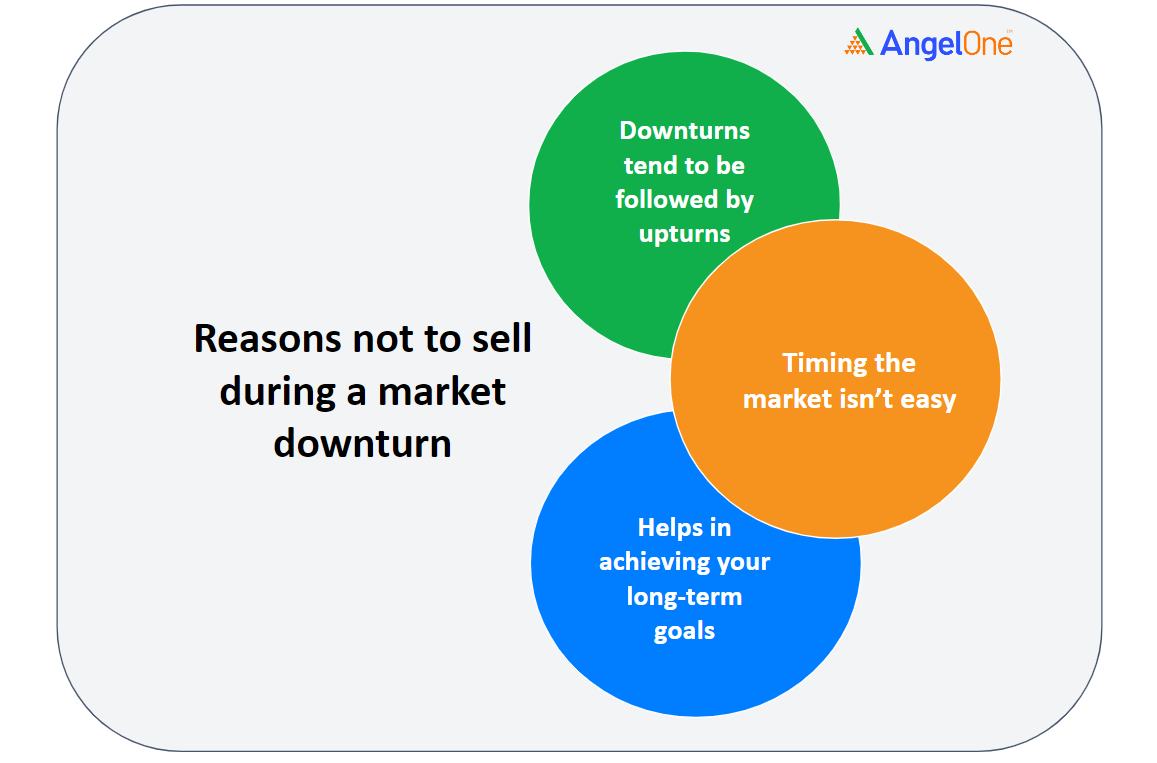Everyone knows that the stock market is volatile, and downturns are a part of it. There are many instances where investors have witnessed these stock market downturns causing them a lot of fear and anxiety. But as a long-term investor, you should know that the market and the economy will recover eventually, and you should be ready for such a rebound.
In such a situation, you shouldn’t despair and make decisions in a hurry. Rather you should know how to handle such situations. Basic cash flow management knowledge and an understanding of the market will help you do so. Read on to know more reasons why you should not sell during a market downturn.
Reasons not to sell during a market downturn

- Downturns tend to be followed by upturns
There have been multiple recessions and downturns in the history of the Indian stock market. According to past records, almost every downturn has bounced back, which means downturns are likely to be followed by upturns. For instance, let’s talk about the financial crisis of 2008, which adversely impacted the Indian economy and the stock market. It led to a subsequent decline in BSE SENSEX from 20325 points (opening) to 9647 points (closing). However, the stock market started rebounding in 2009 (closed at 17464 points), and by the end of 2010, SENSEX had crossed 20,000 points. (Source: BSE) Just like this market crashes of 2015, 2016, 2020, and others have also bounced back. So, it is advisable to sit tight and stay invested during this time rather than panic selling.
- Timing the market isn’t easy
Want to sell the securities to save yourself from a decline in portfolio prices during a downturn? Then you must know that timing the market won’t necessarily help you save your losses. Generally, when investors are urged to sell, they are likely at a loss on their investment; thus, they sell by timing the market, locking even more losses. Rather, you should keep a long-term vision in mind and not panic sell. When you have thoroughly researched about the company (fundamentals, future plans, growth prospects, and more) before making your investment decisions, you have a solid reason to hold onto your investment during recessions with the belief that it will earn you good returns when the market bounces back.
- Helps in achieving your long-term goals
Whether the market is up or down, it is advisable to stay true to your investment goals without letting market downturns affect your decisions. This will keep you on track to achieving your long-term goals. If you are investing a certain amount on a regular basis or you have invested a lump sum amount, keep investing or stay invested irrespective of market ups and downs to achieve your goals within your investment horizon. In case you wish to exit from your long-term position, it should be a strategic decision rather than a momentary decision. However, you can adjust the weightage of different holdings to minimize your risks and maximize your returns.
Conclusion
Market upturns and downturns are an inherent part of the stock market. If you are investing in the market, you should be patient and stay focused on your long-term investments rather than market downturns. Your decisions of selling should be strategic and not based on panic selling rather, they should rely on your research. This will help you stay on track toward your investment goals.
Explore the Share Market Prices Today
| IRFC share price | Suzlon share price |
| IREDA share price | Tata Motors share price |
| Yes Bank share price | HDFC Bank share price |
| NHPC share price | RVNL share price |
| SBI share price | Tata Power share price |
Disclaimer: This blog is exclusively for educational purposes only.

